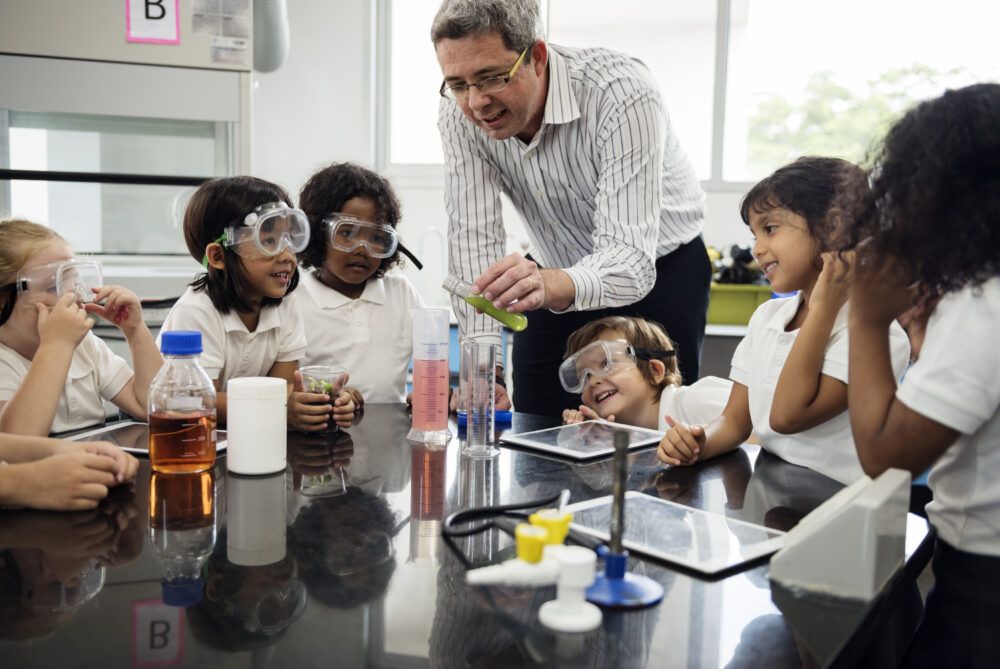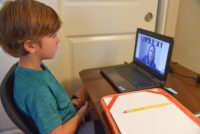Creating a science-friendly environment and encouraging kids to experiment, ask questions, seek answers and take part in science programmes can inspire them to fall in love with the subject
Dubai, Nov 10, 2021: As we celebrate World Science Day for Peace and Development today, teachers from the UAE share their experiences and teaching practices that help them spark a love for science among students.
To ignite curiosity and develop a love for the subject, teachers are relying on various methods ranging from connecting curriculum to real world situations, creating STEM projects and science fairs to making scientific experiments fun, helping them keep up with the latest discoveries and giving them opportunities to apply what they learn. These engaging, interactive, hands-on experiences enable students to experiment, observe, analyse and understand concepts better and develop a scientific temper.
Waad Seifeddine, Chemistry Teacher, American Academy for Girls

In order to impart a love of science among my students, I engage and ignite their curiosity in learning. As educators, we must create an environment where students are empowered at every level to take risks in maximizing their learning and growth. To do this, students are made to participate in science fairs and innovative STEM projects. This allows our students to become creative thinkers, collaborative problem solvers and innovators who relate science to real life applications.
Brittney Freeman, Science Teacher (Grade 5), Bright Learners Private School

We impart the love of science among our learners by igniting their curiosity about the world around them. From the first week of school, our learners participate in explorations with the mindset of a scientist. Our science instruction consists of weekly experiments and quarterly project-based learning assignments to allow students to explore new concepts, show what they have mastered and provide opportunities for enterprise, innovation, creativity and social contribution through all curricular areas. With the use of a variety of resources such as e-learning platforms, science labs, virtual field trips, simulations and teacher-created presentations, we provide a wide range of learning opportunities in science that are engaging, inspiring and motivating for our learners.
We know that children are born curious and they are eager to learn about things that directly impact them, so we ensure that our curriculum content is aligned with their personal interests, goals and aspirations. We provide opportunities for learners to explore different career paths in science and discuss how these positions can benefit the society.
Katie Williams, CP Coordinator and MYP Sciences, Fairgreen International School

I impart a love of science by connecting the curriculum to relevant and real world situations. The excitement of learning ultimately comes from letting students ask questions and providing them the tools to determine what might be possible.
Kelly Walters, High School Science Teacher, Dunecrest School

When I think about how I get kids to love science. I get them to see the science in the world around them by sharing how I see it. My goal is not for them just to learn what they need to know but to see what they know in the world around them. It is important for them to see science in their everyday life, to experience it. It becomes more to them than just what is in a textbook. I always try to deliver it in a fun and interesting way whether it is a drama between Sodium, Chlorine and their Ionic relationship or why everyone likes Fluorine more than everyone else on the table even though she is the most electroNEGATIVE. Science is beautiful, science is life, science is fun!
Jad Daher, Secondary Science Teacher, GEMS American Academy Abu Dhabi

We implement different pedagogical methods to motivate and encourage the love of science amongst our students. Personally, I always apply a student-centric approach to ensure the highest student engagement rate. Therefore, the use of project-based units may feature activities that students can relate to real-life concepts, such as learning about maintaining biodiversity through spiders or butterflies. In addition, the use of hands-on activities, including scientific research and fun experiments, helps students learn in a way that engages them in the learning process.
Furthermore, students are expected to work on outcomes of their own personal choices with clear checklists and rubrics; this might include creating web pages, making documentaries, or even designing picture books. It all depends on the subject and the best project that fits the objectives of each unit. Another engagement element that I use is giving the learners real-life responsibilities. For example, learners were asked to work on a physics project that required them to create a functional roller-coaster with marbles and pipes for Abu Dhabi Ferrari World.
Dr. Kate Plumb, Head of Secondary & Chemistry teacher, Aspen Heights British School

I impart a love of science in my students by delving deep into the ‘working scientifically’ aspect of the curriculum. I feel it is also important to bring science to life in the laboratory and draw parallels with real life experiences. Our students love hands-on science, so we build many opportunities for them to work collaboratively in our science labs. For our Science Week we have an in-depth focus on inspiring scientific role models, and this has had a significant impact on many of our students.
Gerlyn S. Cortez, Middle School Science Teacher, Nibras International School

I ensure students are active participants in their learning journey. I make sure that every lesson is real, meaningful and relevant. I show them how these theories have real-life applications. Also, I try to make them realize that knowledge or application of knowledge is power.
Creating a love of science among my students is not seen as a challenge, instead it is always an opportunity in helping them realise that science is not just a subject but a powerful tool for everyday life. I always get the students involved in science through different hands-on, learning activities that are not just accurate but will also give them a sense of wonder. I also give opportunities for higher order thinking skills by asking them to create or design new ideas, which will bring to life whatever concepts they have learned.
Aaisha Rabbani, Secondary School Physics Teacher, Park House English School

I impart a love of science among my students by making the content relevant to their experiences and observations of daily life. I do my utmost to engage their curiosity and address their misconceptions. Making science accessible can be simple – providing them with learning tools such as simulations, engineering toys, experiments and projects that allow them to get involved in their learning. Most importantly enthusiasm for the subject can be contagious!
Kerri Allen, Science Specialist KS2, Science Curriculum Lead KS2 & Apple Teacher, Reach British School

I have always loved science and at one time wanted to be a scientist. Because of this, I am able to share and impart a love for science naturally among my students. I do this by showing them that science is fun and exciting. It is a subject that we can see all around us and experience all the time. I show the students that curiosity is what science is built from and curiosity is a great trait to have. I teach the students that learning, investigating and experimenting will always be important and the knowledge they receive from science, along with maths and design and technology will be used throughout their lives.
Ayesha Parki, Science Teacher, The Aquila School

Children are not always aware of the incredible science we view every day. I love ensuring that my students know the link between everyday scientific innovations, such as electric cars, AR technology and robotic doctors, and how these innovations make our world amazing. By looking into the science of all living organisms, including how their own body works, students are able to relate to their learning in a way which cannot be done in every subject. Empowering children to perform and demonstrate their understanding of all the aspects of science during experiments is the key to them progressing. I believe learning the theory and following that with exciting challenges outside the classroom will hugely benefit their passion in science, just like it did when I was a student.
Aditi Rana, ScienceBiology Teacher, NewLands School

Science is all about asking questions and finding ways to figure out the answers. Kids are uniquely curious; they love to know HOW things work. My goal as a science educator is to reawaken the curiosity and creativity in my students. All of my lessons and tasks are always centered on identifying real problems in the community, gathering meaningful data, setting up experiments and then finding solutions.
Daniel Mellor, Grade 5DM Homeroom Teacher, Raffles World Academy

Facilitating students to take charge of their own learning is one of the key steps to promoting science. They can decide what they would like to investigate and how they will approach the problem (with the teacher’s guidance of course). Let them fail and let them make mistakes; this is such an important step in developing a better understanding. I often find students are far more engaged when they are investigating something of their own choosing.
Get them out of the classroom. Science is all around us and we should be using our environment to our advantage. Observe how shadows change throughout the day, check for patterns in students’ heart rates after climbing the school stairs, collect different types of leaves and try to classify them into different groups – there are so many learning opportunities available to us.
Finally, and most importantly for our primary students, is to make learning fun. Not just science but across all subjects. Let’s face it, no child is ever going to fall in love with a subject that they find boring.
Felicity Mayrs, Head of Science, Repton Al Barsha

My passion for science made the decision to become a science teacher an easy one. It’s a career where you can share your love and joy of a subject on a daily basis. Children of all ages have naturally inquisitive minds and our role is to support them in their investigation of the world around us. It is important that they are not just given the answers but have the opportunity to discover the wonders of science for themselves. This can be achieved at all ages through research and practical investigations. Most importantly though, it is the teachers’ enthusiasm and love for their specialism that can really bring learning to life.
Aisling Crowe, Head of Science, Repton School, Abu Dhabi

I love seeing students plan their own experiments with guidance; making their own hypothesis, trial methods and analysing their own results really gives them a sense of ownership and autonomy over their practicals and ensures they are always excited and looking forward to all their practical lessons. I also love to ensure that students realise I’m not just a science teacher but consider myself a scientist very much still in awe of all that is happening right now in the scientific world. Sharing news articles and videos on new stem cell treatments, inner solar systems discovered only 35 light years away and of course my favourite hybrid animals never fails to impart a love of science among students I teach.
Arslan Ahmad Bhatti, Head of Biology, Senior Science Department, Repton School, Dubai

First and foremost is my own passion and enthusiasm for science and biology. This is highly infectious and students immediately mirror this in lessons. My particular specialty lies within the field of molecular biology and pharmaceuticals. I use this experience to make real world links that may not be a part of the actual curriculum but are fascinating. I find that introducing challenges and making lessons almost like a game with levels to complete helps a lot to promote engagement within science. This generates an innate love for science amongst our students.
Salma Patel, Head of Science, Star International School, Al Twar

My passion for the world around us and bringing science to life for my students is what motivates and drives me to be better. I like to spark curiosity in my students through questioning and engage them through practical activities and problem solving. Researching and debating stem cell therapy, climate change, fertility treatment and medicine all helps with trying to make sense of the world we live in and our place in society.
Jahida Janna, Secondary Science Teacher, Star International School, Mirdif

To instill love for science in students it’s important to inspire students. One way that we are achieving this is by treating our students and speaking to them as though they are scientists. Children are natural scientists given their curiosity of the world around them and as teachers it is our responsibility to foster and mould that curiosity. In addition to this, we are actively highlighting young scientists and inventors from around the world in order to further inspire our students. Students and non-students alike often picture a scientist as someone much older. By showcasing young scientists such as 15 year old Gitanjali Rao who developed her own invention at the tender age of 13 and Jack Anadraka who won the grand prize at Intel International Science and Engineering Fair in 2012 aged 15 years, students are able to relate to them and aspire to be like them.
Rachel McAllister, Science Teacher / Grade 7 Leader, Uptown International School

Creating opportunities for students to question the science that is happening all around them in their everyday life encourages their critical thinking and contextualises their learning. Children are naturally inquisitive and helping them to understand scientific concepts by doing their own research and performing experiments makes science lessons interesting, engaging and, most of all, fun! As a science teacher, there is nothing more rewarding than those ‘aha!’ moments that happen in the classroom when students are working together, lab coats and safety goggles on, exploring the subject for themselves.








